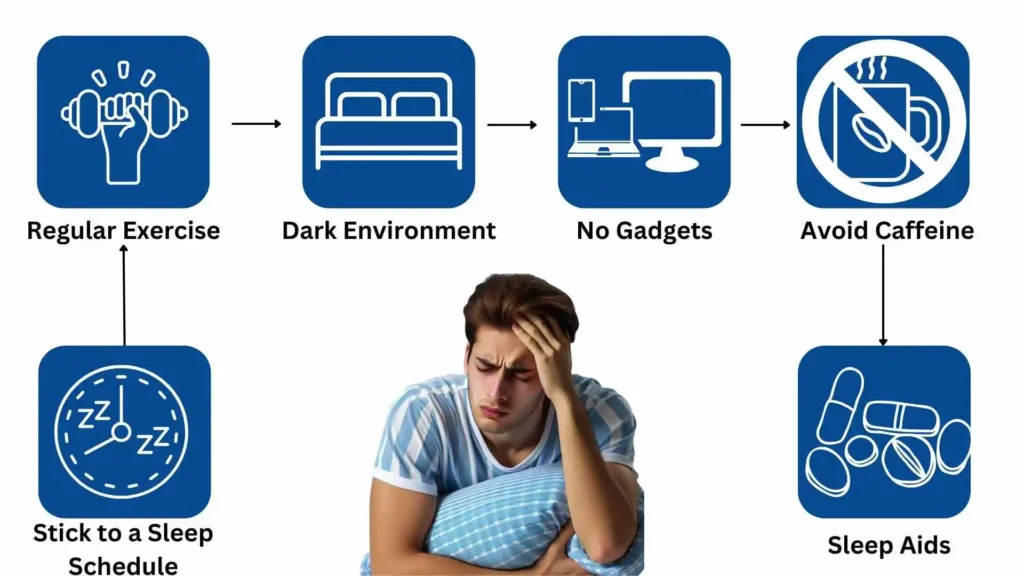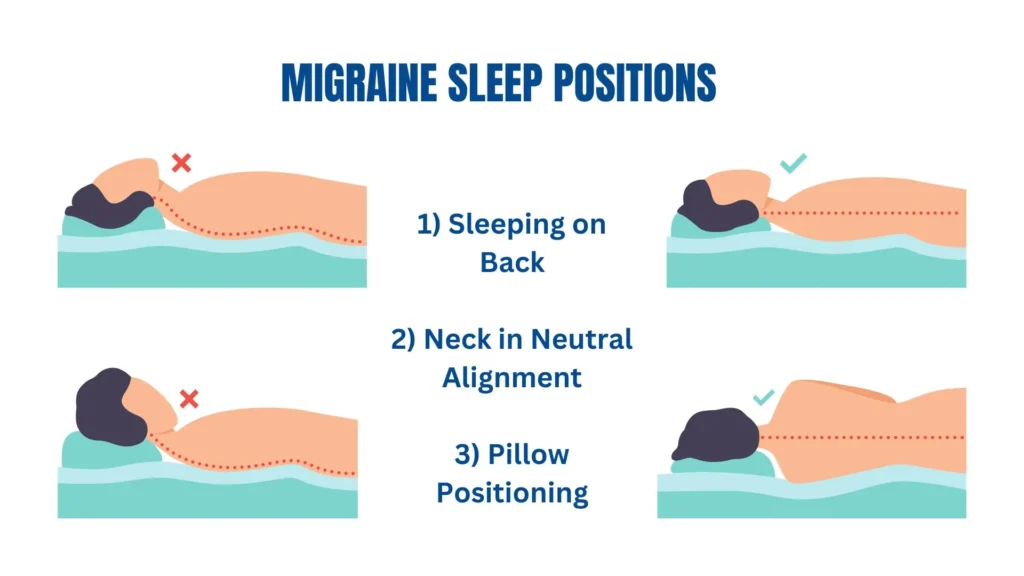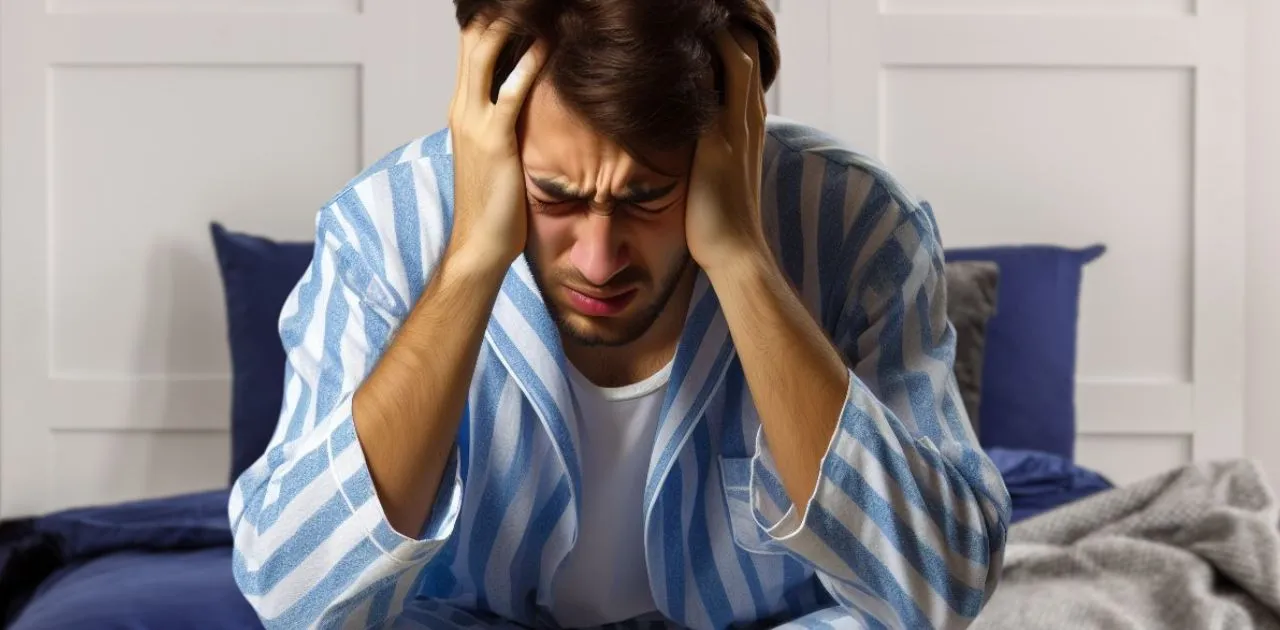Migraines, with their throbbing agony and disruptive symptoms, have cast a shadow of pain over the lives of millions. Yet amidst the chaos, there exists hope in the connection between sleep and migraine management, i.e., migraine improved sleep habits.
Although the exact cause of migraines is unknown, research has highlighted the intricate relationship between sleep and migraine. It is crucial to note the significant role that sleep habits play in the onset, frequency, and severity of migraines.
Developing effective sleep habits is essential for managing and alleviating the symptoms of migraines, as headaches from changing sleep schedules could also occur.
Table of Contents
What is Migraine?
A migraine is a severe kind of headache. It causes a pulsing sensation, throbbing pain, and one-sided head pain. It is often accompanied by vomiting, nausea, and extreme sensitivity to light and noise. Migraine attacks can last for at least hours, but they can also last for days.
A lack of migraine improved sleep habits may cause various types of migraine:
- Migraine without aura, also known as “Common Migraine.”
- Migraine with aura, also known as “Classic Migraine.”
Migraine Aura is a “warning signal” that occurs before the migraine headaches. It can be a sensory disturbance, visual, or dysphasic aura.
Common Symptoms
Migraine affecting children and adults go through four phases:
Prodrome – one or two days before, patients felt symptoms such as constipation, mood swings, increased urination, and neck stiffness.
Aura – may occur before or during migraine, such as seeing various shapes, impaired vision, bright spots, pin and needle sensation in limbs, and difficulty in speaking.
Attack – usually lasts for 4-72 hours; the patient may feel pain on one side of the head, throbbing and pulsing sensation, and vomiting.
Post-drome – a person may feel drained out or have an alcohol-induced hangover, known as migraine hangover.
So, improved sleep habits should be adopted to minimize the effects of migraines.
6 Migraine Improved Sleep Habits
Let’s start with the most crucial part of this blog, Migraine Improved Sleep Habits, as headaches are also caused by changing sleep schedules.

1. Stick to a Sleep Schedule
According to the American Migraine Foundation (AMF), getting adequate sleep is good for health as it leads to fewer migraine attacks. Whereas having inadequate sleep patterns leads to increased chances of migraine attacks, i.e., excess and lack of sleep causes migraines.
It also suggests getting a good 7-8 hours of sleep and maintaining sleep-wake cycles. Similarly, avoiding naps is an important habit to adopt to improve migraines. If you take naps during the day, it would become problematic to sleep at night.
Hamilton says, “Irregular sleep and wake time increases your chances of a migraine attack.” So, the person should sleep and wake at the same time every day as migraines hate changes. The patients need to follow strict rituals.
2. Regular Exercise and Yoga
A new study related to the benefits of Yoga for migraines found that Yoga is a non-medical, popular treatment for migraines. These complementary and integrative treatments for migraines are really essential.
Yoga can be a part of the migraine management plan, and it incorporates habits that help improve sleep during migraines. The study conducted in India suggested that those who practiced Yoga for 60 minutes every day had a reduced risk of migraines and headaches by up to 50%.
Moreover, practicing relaxing exercises such as deep abdominal breathing and regular exercise habits helps in better sleeping. But one must keep in mind not to overdo any exercise or Yoga as “Excess of everything is bad,” and it could also become a trigger for migraine. Excessive exercise is also the worst habit that can harm your knees.
3. Create Dark Environment
Take note of what your room looks like. Is it suitable for sleeping? What is the environment? As Dr. Rosen suggested, a dark, cool, and quiet room for sleeping.
Migraine-improved sleep habits include creating a soothing and relaxing place. According to the Sleep Foundation, the ideal bedroom for better sleep should have the following things:
- Appealing, warm colors of the walls to make you feel at ease
- Reducing clutter as too many things cause anxiety and stress
- Blackout curtains should be used if your room has too much exterior light
- Try to make your room as dark as possible to reinforce an active circadian rhythm
- Blocking external sounds can cause several awakenings
- Use the right scents in your room, as they also promote better sleep; you could use scented candles
- Your bed and mattress should be ideally built to suit your body weight and posture
4. Avoid Usage of Gadgets before Bedtime
Are you addicted to using electronic gadgets before bedtime? If so, it is better to get rid of this habit as it disturbs the circadian rhythm, i.e., the natural sleep-wake cycle.
The light that is emitted from mobile, laptop, or tablet screens makes it difficult to fall asleep as it keeps the brain active. It is recommended to turn off all the gadgets an hour before bedtime as the body needs time to shift to sleeping mode.
Moreover, you could develop a reading habit before bedtime as it will help you relax your mind and make it easy to fall asleep. You could also spend some time listening to soothing or calm meditation before sleeping, as a migraine improves sleep habits.
5. Avoid Intake of Caffeine
Rosen also suggested taking note of your food and drinking, affecting the severity of your migraine. Caffeine is basically used to help you get alert and wake up when you feel tired or sleepy. It should not be used as a substitute for sleeping, as most people use it.
Avoiding caffeine before bedtime is suggested as an improved sleep habit for migraine; similarly, avoiding alcohol is also recommended. Why? Because it actually disturbs your sleep patterns, unlike the common assumptions of enhancing sleep patterns.
Some people intake caffeine as they find acute treatment by consuming caffeine. But for some people, it may not work. So, it is better not to take a risk on your health as many people are sensitive to caffeine, and it can also trigger migraine.
6. Sleep Aids
Two nutritional supplements help migraine patients better fall asleep: Melatonin and Magnesium. Research shows that people having migraines have a lower level of melatonin hormone in their body, which makes it difficult for them to fall asleep.
Intake of a small amount, i.e., 1-5 mg of melatonin, which is a hormone regulating sleep, helps in the betterment of falling asleep or staying asleep. The supplementation of sleep aids is also an improved sleep habit for migraine.
You can also learn whether melatonin is habit-forming or not.
Similarly, studies have shown that 400mg of magnesium intake, which is a chemical that helps the body relax, could help minimize the frequency of migraine attacks. It has a calming effect and should be taken before bedtime to avoid sleepiness during the daytime.
Why Does Sleep Help Migraine?
Clinical experiences suggest that if patients are able to sleep during migraine attacks, they will awake feeling better. There may be various reasons why sleep helps migraine:
- Regulation of neurotransmitters such as dopamine and serotonin, involved in migraine pathophysiology during sleep
- Various physiological processes promote recovery and relief during sleep, and the body goes through a healing process.
- High levels of stress and tension are also reduced by sleeping with a migraine, which are the triggers for migraine.
- Analgesic effects, i.e., reduction of pain perception, caused by sleep
- It enhances the effectiveness of medications for migraines.
Migraine Sleep Position
Migraine sleep positions accompany migraine-improved sleep habits. Both of these go hand in hand since headaches caused by changing sleep schedules could also occur by changing sleep positions.

1. Sleeping on Back
Sleeping on the back allows the neck, spine, and head to rest in a neutral position. This position helps minimize pressure points on sensitive areas of the head and neck by equally distributing weight.
2. Neck in Neutral Alignment
It is recommended to find a neutral position for the neck in either back positioning or side sleep positioning. Avoid curvatures in the spine or excessive bending or twisting that can strain the muscles and trigger migraines.
3. Pillow Positioning
The pillow should be positioned in a way that the angle shouldn’t be too high or too low, causing the neck to bend upwards or downwards. Experiment with your pillow support to find the most comfortable option for your neck and spine rest.
Sleep and Migraine: A Bidirectional Relationship
According to sleep medicine physician Dr. Pranshu Adavadkar, “Inadequate sleep or sleep fragmentation increases pain sensitivity and worsens migraine headaches, which, in turn, may interfere with sleep.”
The relationship between sleep and migraine is indeed bidirectional. Both sleep and migraine influence each other. Like changes in sleep patterns, both excessive and insufficient sleep patterns become a trigger for migraines.
Similarly, migraines also affect sleep patterns, making it difficult to stay asleep or fall asleep. This relationship can be improved by adopting habits that help in improving migraines.
Moreover, the interaction between brain parts that are responsible for sleep-wake cycles, i.e., the Hypothalamus and pain perception, plays a crucial role in sleep and migraines. Also, certain neurotransmitters and chemicals, i.e., Orexin (Hypocretin), Adenosine, and Melatonin, in the brain are involved in this complex relationship.
How to Sleep with a Migraine?
Sleeping with a migraine is a strenuous task to do. People with migraines may find it difficult to fall asleep or stay asleep due to the throbbing or pulsing sensations accompanied by one-sided head pain. Research has shown that migraine attacks occur more frequently between 6 am and 12 pm.
If you get migraines at the same time every day, it might be due to your sleep pattern. Improving sleep patterns helps in reducing migraine headaches. Therefore, the easy way to sleep with a migraine is to follow the following migraine-improved sleep habits.
Can you get Migraines from Lack of Sleep?
Various sleep habits could improve migraine. But before that, it is important to learn that lack of sleep causes migraines.
Studies related to migraine sufferers claim that those who slept for only six hours at night are at more risk of or suffer from severe headaches as compared to those who sleep for eight hours or longer and have minimized headaches.
In addition to sleep irregular patterns, sleep disorders are also linked to certain types of headaches, such as migraines and tension-type headaches. The sleep disorders that are observed in people with migraines are:
Sleep Apnea – characterized by pauses in breathing during sleep, leads to fragmentation in sleep and oxygen desaturation that ultimately triggers migraines
Circadian Rhythm Disorders – characterized by disturbance in the body’s internal clock, delayed sleep phase disorder, or shift work disorder, lead to irregular sleep-wake cycle, ultimately leading to migraines.
Insomnia – characterized by difficulty in falling asleep, staying asleep, or non-restorative sleep. Chronic insomnia becomes a trigger for or increases the risk of migraines.
Conclusion
A better night’s sleep will help you feel better in many ways. It can also prevent migraine attacks and reduce the severity of migraine in your life. There are various ways mentioned above that help improve migraine sleep habits.
It is also essential to find the best possible strategies that work best for you, as each individual’s preferences and approaches are different. If these steps don’t benefit you in the right way, you need to consult your doctor to help you get better with your migraines.
FAQs
What is the difference between a migraine and a headache?
Migraine is a lifelong neurological disorder characterized by throbbing pain, pulsing sensation, and one-sided headache. On the other hand, headaches commonly refer to pain that arises from different parts of the head, such as the foreheads, temples, and back of the neck.
A migraine lasts from hours to days, while a typical headache lasts for 5 minutes to 4 hours.
How many hours a migraine patient should sleep?
A migraine patient should sleep for 7-9 hours a day. The quality and quantity of sleep for a migraine patient could be enhanced by following migraine improved sleep habits.
How do you heal a migraine fast?
Medication is the first and foremost thing to prevent and heal migraines. Besides medication, important healthy habits should also be adopted to reduce the pain caused by migraine and also to reduce the number of migraine attacks.




